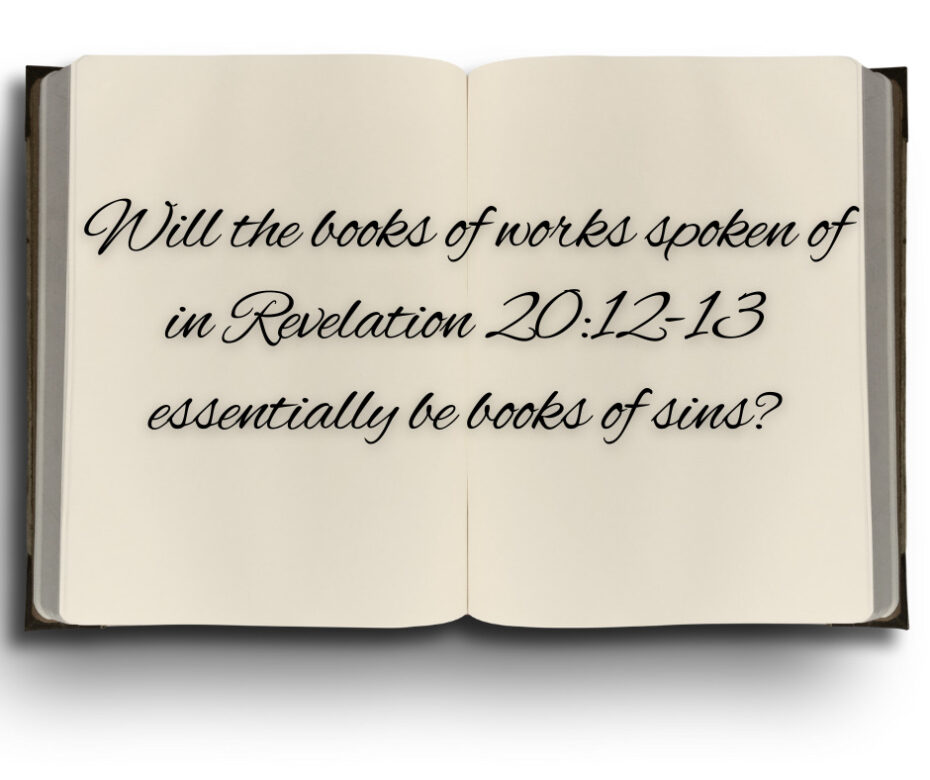Jeff asked a follow-up question about a recent blog I wrote entitled, “Where Did Chafer Say We Don’t Have a Sin Problem; We Have a Son Problem?” See here. Jeff said,
However, Rev 21:8 seems to fly in the face of that thinking, making the saying [unbelievers don’t have a sin problem, they have a Son problem] inaccurate at best: “But the fearful, and unbelieving, and the abominable, and murderers, and whoremongers, and sorcerers, and idolaters, and all liars, shall have their part in the lake which burneth with fire and brimstone: which is the second death.”
It seems like, based on this verse, that the following is true:
- Their sins are imputed to them.
- They do need to deal with their sin problem.
- The book of works can be defined as their sins. And,
- The reason they are in the lake of fire is their sin, and not just their unbelief.
I wrote on Rev 21:6-8 previously. See here.
But Jeff’s question is a bit different, and therefore I will discuss the ramifications of Rev 21:8.
Revelation 21:6-8 describes three different types of people: the believer who gets into the kingdom but who will not reign with Christ (v 6), the overcoming believer who will rule with Christ (v 7), and the unbeliever who will be excluded from the kingdom and will spend eternity in the lake of fire (v 8).
The same three groups are seen in Rev 22:14-17, though the order is different: the overcomers who will rule with Christ (v 14), the unbelievers who are outside the kingdom (v 15), and the believer who has simply received the water of life (v 17).
At the end of Revelation 21, the Lord reveals that outside the kingdom will be all sinners, whose names are not in the Book of Life (Rev 21:27).
The key is the Book of Life. People in the Book of Life will be in the kingdom. People not in the Book of Life will be cast into the lake of fire (Rev 20:15; 21:27). The way people get into the Book of Life is by believing in Jesus for everlasting life (e.g., Luke 10:20; Phil 4:3). Unbelievers die in their sins (John 8:24). That means they will forever be in bondage to sin and will forever be sinners. To say that there will be no sinners in the kingdom is to say that only those in the Book of Life will be in the kingdom. Unbelievers are not excluded from the kingdom because they sinned in this life. (We did too!) They are excluded because they are not in the Book of Life. (We are!) There are consequences for the deeds they did in this life. The degree to which they will be tormented will depend on their works.
Now let’s answer Jeff’s four points directly:
First, the word translated impute is logizomai. It means “to credit something to someone” (BDAG). That is, our sins were credited to Jesus (2 Cor 5:21) and His righteousness is credited to all who believe in Him (2 Cor 5:21). The NT never refers to one’s own sin being imputed to himself. But, if I understand Jeff’s point, yes, unbelievers do have bad deeds that will be reviewed in the book of deeds (Rev 22:12). They will be evaluated as deeds (according to Rev 20:12-13), not as sins per se.
Second, since they reject the free gift of everlasting life, they will be in the lake of fire. But their degree of torment there will be based on their works (not their sins). That does include their bad deeds.
Third, the book of deeds is not a book of sins. It is called a book of works (Rev 20:12-13). Works are both good and bad. It is wrong to think that an unbeliever will only have bad deeds on his record. Unbelievers will have lots of good deeds in the books. Think of all of the people who never believed in Jesus for everlasting life and yet who fed the hungry, healed the sick, visited the prisoners, loved their spouses and children and neighbors, etc. Since unbelievers still retain the image of God, they do good works. Didn’t the Lord Jesus say that even unbelieving parents give good gifts to their children (Luke 11:11)?
Fourth, the reason they will be in the lake of fire will be solely because they never believed in Jesus and hence never got their names in the Book of Life (Rev 20:15). However, the degree of torment they will experience in the lake of fire will be directly related to their works, both good and bad.


